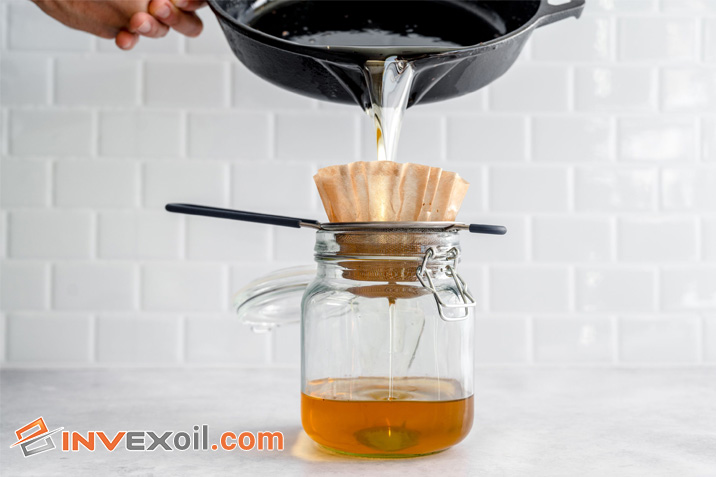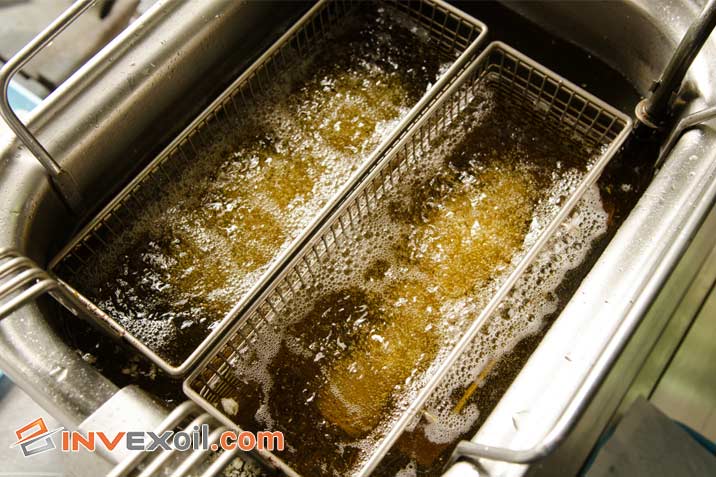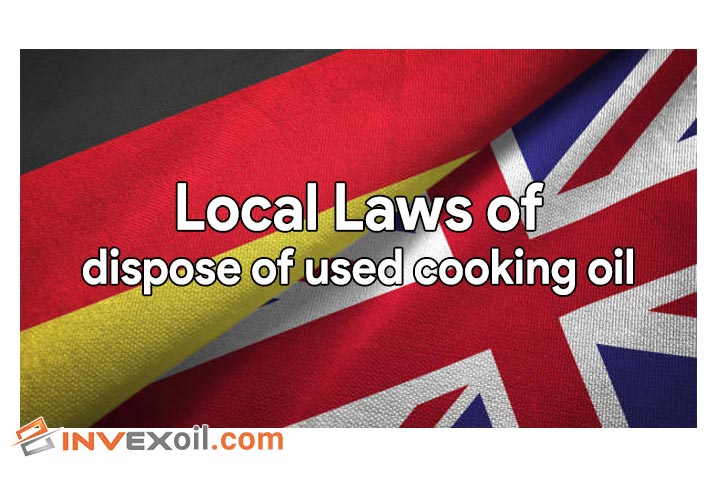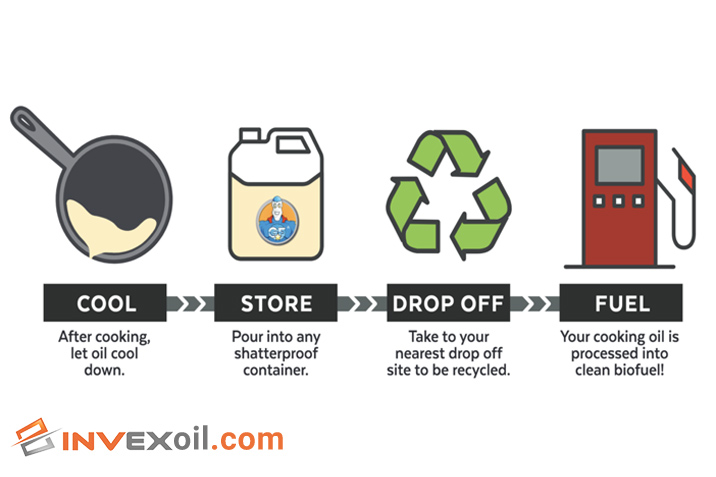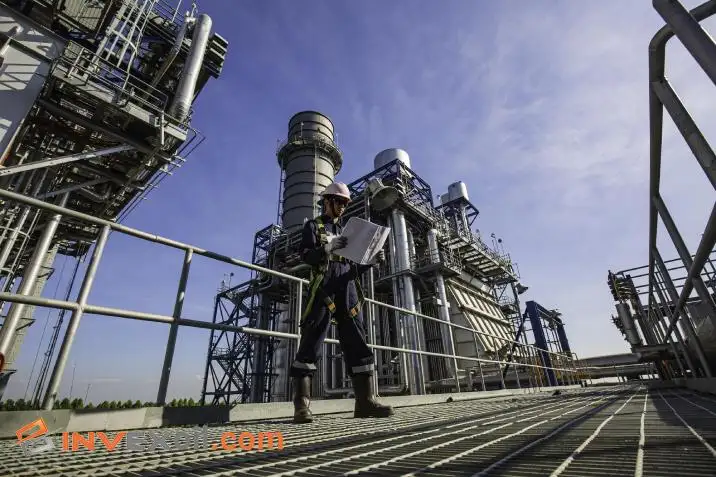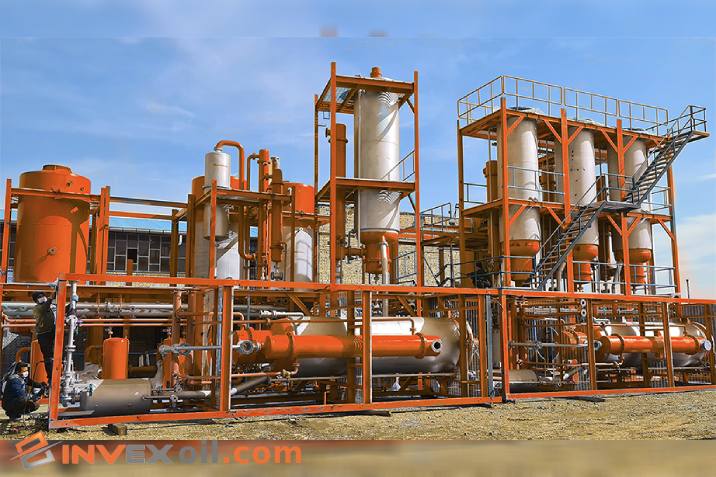Kitchens are bustling places where culinary creations take center stage, and we often fail to pay conscious attention to how used cooking oil should be collected and how to properly dispose of used cooking oil. There’s a lot at stake, not just for our households but also for the environment.
In this article, we’ll take a closer look at oil recycling in used oil re-refining, sustainable approaches, Local Laws about Disposal in the UK, Wales, and Germany, and how making the right choices when disposing of cooking oil can make a big difference.
Table of Contents
How to Store Used Cooking Oil Before Disposing of It
Properly storing used cooking oil is a fundamental aspect of adopting eco-friendly practices in the kitchen. It’s not just about maintaining the oil’s quality for future use but also about ensuring you handle this kitchen staple in an environmentally responsible manner.
When it comes to storing used cooking oil, here are some key considerations:
-
Container Selection:
Choosing the right container is critical. Opt for options like glass jars or sealable plastic containers. These choices provide an airtight and light-proof environment, preserving the oil’s freshness and preventing it from turning rancid.
-
Storage Duration and Conditions:
How long can you safely store used cooking oil? The answer depends on various factors, including the type of oil and the conditions in which it’s stored. Understanding the recommended storage durations and maintaining a cool, dark storage location is essential for keeping your oil in its best condition.
Exploring Different Methods of Cooking Oil Disposal
In this comprehensive section, we’ll examine a range of disposal methods for used cooking oil. Each method comes with its own set of pros and cons, and it’s crucial to choose the one that aligns with your values and needs. Let’s take a closer look:
1-Pouring It Down the Drain
This is perhaps the most convenient option, but it’s not without its challenges. Pouring used cooking oil down the drain can lead to plumbing woes and environmental harm. Let’s weigh the pros and cons:
| Aspect | Pros | Cons |
| Ease of disposal | Quick and easy | Risk of clogged pipes and sewage issues |
| Environmental impact | May contribute to water pollution | Harmful to aquatic life and ecosystems |
2-Throwing It in the Trash
Disposing of used cooking oil in the regular trash might seem straightforward, but it comes with its own set of considerations, particularly in terms of landfill concerns:
| Aspect | Pros | Cons |
| Landfill impact | Less risk of plumbing issues | Contributes to landfill waste |
| Environmental impact | Reduced risk of water pollution | Long-term environmental consequences |
3-Composting Used Cooking Oil
Composting is an eco-conscious choice for handling used cooking oil. Let’s delve into how this method can be both environmentally friendly and effective:
| Aspect | Pros | Cons |
| Environmental impact | Reduces waste and enriches soil | Requires knowledge of proper composting techniques |
| Resourceful recycling | Turns waste into valuable compost | Not suitable for all types of cooking oils |
In summary, choosing how to properly dispose of used cooking oil involves considering factors like convenience, environmental impact, and your commitment to sustainable practices. Each method has its own merits and drawbacks, so it’s essential to make an informed decision based on your specific circumstances.
4-Deciphering the Legal Landscape
In this crucial segment, we embark on a journey through the realm of laws and regulations governing the disposal of used cooking oil. Understanding these legal aspects is paramount for responsible and eco-conscious disposal.
Local laws to dispose of Used oil in the UK, Germany, and Wales
Navigating the legal framework for used cooking oil disposal in the UK is crucial for environmental responsibility. Key UK laws and regulations include:
- Environmental Protection Act 1990: Addresses controlled waste disposal, emphasizing environmental protection.
- Waste (England and Wales) Regulations 2011: Provides guidance on waste management, essential for businesses using cooking oil.
- The Control of Pollution (Oil Storage) (England) Regulations 2001: Governs safe oil storage to prevent pollution incidents.
- Local Authority Regulations: Check your local council for area-specific requirements.
- Penalties for Non-Compliance: Violating regulations can lead to penalties and legal action, harming the environment.
Summary of Local Regulations in Germany
Let’s start with a comprehensive overview of the key regulations in Germany concerning the disposal of used cooking oil. This table outlines critical information, including the responsible authorities, disposal requirements, and potential fines for non-compliance.
| Aspect | Responsible Authority | Disposal Requirements | Potential Fines |
| Proper disposal channels | Federal Environmental Agency | Collection centers or recycling | Fines for improper disposal |
| Environmental impact | Local Environmental Agencies | Ensuring minimal environmental | Penalties for ecological harm |
| Public awareness | Municipalities | Awareness campaigns for residents | Non-compliance fines |
Local Regulations in Germany
Now, let’s zoom in on the specifics of legal obligations within Germany. Understanding these local regulations is essential for residents and businesses alike, as they outline proper disposal channels and penalties for non-compliance.
- Proper Disposal Channels: In Germany, used cooking oil must be deposited at designated collection centers or recycling points. Pouring it down the drain or discarding it with regular household waste is strictly regulated.
- Environmental Impact: Local Environmental Agencies ensure that disposal methods have minimal ecological impact. This includes monitoring the safe handling and recycling of used cooking oil to prevent harm to the environment.
- Public Awareness: Municipalities play a vital role in educating residents about responsible cooking oil disposal. Awareness campaigns aim to inform the public about the environmental consequences of improper disposal and promote adherence to local regulations.
Assessing Environmental Consequences
In this segment, we embark on a data-driven exploration of the cooking oil environmental impact associated with each disposal method. Our mission is to unravel which choice emerges as the most eco-friendly in the realm of used cooking oil.
1-Environmental Impact Assessment
Let’s kickstart this journey with a quantitative assessment of the environmental repercussions tied to different disposal methods. This table serves as our compass, providing a comprehensive overview of the impact metrics:
| Aspect | Pouring Down the Drain | Throwing in the Trash | Recycling |
| Water System Contamination | High | Minimal | Negligible |
| Greenhouse Gas Emissions | Moderate | Moderate | Low |
| Contribution to Landfills | Low | High | Virtually None |
2-Impact on Water Systems
Our first pit stop explores how each disposal method can impact local water systems. The analysis underscores the importance of making eco-conscious choices in this domain.
- Pouring Down the Drain: This method raises concerns of contaminating local water systems due to the grease and residues present in used cooking oil.
- Throwing in the Trash: Although it might seem harmless, discarding cooking oil in regular trash can still lead to localized water pollution when it eventually reaches landfills.
- Recycling: The eco-friendly frontrunner, recycling used cooking oil minimizes the risk of water system contamination, making it the preferred choice.
3-Landfill and Greenhouse Gas Emissions
Next, we dive into the consequences of sending used cooking oil to landfills, shedding light on its role in contributing to greenhouse gas emissions.
- Pouring Down the Drain: While it spares landfills, this method contributes to moderate greenhouse gas emissions due to the breakdown of oil in water systems.
- Throwing in the Trash: A high contributor to landfills, this option significantly adds to greenhouse gas emissions as cooking oil decomposes alongside other waste.
- Recycling: Recycling stands out as the eco-conscious alternative that virtually eliminates landfill contributions and keeps greenhouse gas emissions low.
4-Recycling as an Eco-Friendly Alternative
In the spotlight of our article’s main theme, recycling emerges as the eco-friendly alternative to traditional disposal methods. Not only does it minimize environmental harm, but it also paves the way for sustainable reuse of used cooking oil.
Conclusion
In this article, we’ve learned many things about Dispose of Used Cooking Oil and uncovered eco-friendly methods for this culinary necessity. We understand that responsible disposal not only safeguards our environment but also offers the potential for recycling into valuable resources. By adopting these practices, we contribute to a cleaner planet and embrace a sustainable future.
FAQ
How should I dispose of used cooking oil at home?
You can solidify it with absorbent materials and then discard it in the trash, or better yet, recycle it at a local collection center.
Can I pour used cooking oil down the sink?
It’s not recommended. Pouring oil down the sink can clog pipes and harm water systems, so opt for alternative disposal methods.
What can be done with recycled cooking oil?
Recycled cooking oil can be used to make biodiesel, soap, and even animal feed, contributing to sustainability and reducing waste.

Hello, This is Matteo Hudson Copywriter from InvexOil. We are here to provide super-important content to help you learn more easily and be involved in the world of Petroleum and Chemistry. We are here to answer your questions, help you to have better services, and also find the best solution for your problems. Don’t be shy and ask your questions in the comment box or call our number. If you want to connect with me directly, you can search for my name on Linkedin.

